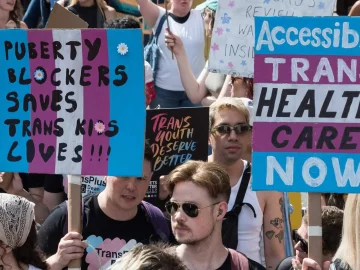Members of the Bundestag have passed a law that allows gender changes theoretically every year.
Germany adopted a law on gender self-determination: what does this mean for citizens
The German parliament has passed a law promoting gender self-determination, designed to streamline the processes involved in altering names and gender identity. The Self-Determination Act garnered broad approval from the governing Traffic Light coalition, under the leadership of Olaf Scholz. but the debate surrounding it was bitter and emotional. As a result of the vote, 374 deputies spoke in favor of the law, while 251 expressed their opposition. The law will come into force on November 1.
Previously, to change gender, it was necessary to undergo an examination by two doctors (psychiatrists) “well versed in the problems of transsexualism” and obtain judicial permission. Under the new law, adults (over 18 years of age) only need to notify the authorities three months in advance and go through a simple procedure for choosing a new gender from the three provided for in German law. However, once a decision has been made, changes or cancellations are not permitted for a year.
For German citizens aged 14 to 18 years, such an application requires the approval of a parent or guardian. However, even if they refuse, the applicant has the right to apply to the family court to try to overturn this prohibition. For persons under 14 years of age, the application must be submitted by their parent or guardian on their behalf. The new law concerns only legal procedures and does not affect the rules for gender reassignment surgery.

Gender self-determination in different countries: legislation and challenges
Laws to facilitate gender reassignment procedures and their consequences may vary from country to country. Some of the countries that have passed laws or made legislative changes to facilitate gender reassignment procedures include:
Argentina. Here, in 2012, a law was passed that allows people to change their gender and name on documents without the need to undergo medical or legal procedures.
Spain. In 2007, the Equality Act was passed, which also simplified gender and name change procedures for transgender people.
Portugal. The country changed its civil status laws in 2011, allowing people to change their gender on their documents without the need for surgery or medical examination.
Canada. Various provinces in Canada have passed laws and policies to make gender and name change procedures easier for transgender people.
These are just a few examples. Gender identity policies and legislation are constantly evolving, and laws may change over time in different countries.
Apart from the countries mentioned, many others are also working to simplify gender reassignment procedures and its consequences. For example, in the US, different states have their own laws and policies on this issue. Somesome states permit changing the gender on your birth certificate without requiring surgery or court approval. However, approaches may differ significantly depending on the state.
In many countries of the European Union there are also changes in legislation aimed at making the process of gender change simpler and named. For example, Sweden, Holland, and Finland have laws that allow citizens to alter their gender on formal paperwork without the need for medical procedures or court approvals.

One of the main principles underlying these changes is the recognition of the human entitlement to one’s gender identity and self-determination. The desire for respect and recognition of personal gender identity is becoming increasingly important in modern society.
However, despite the passage of laws streamlining processes for gender reassignment challenges remain regarding social acceptance and support for transgender people. This may include combating bias, availability of medical services, and psychological assistance access, and creating inclusive educational and work environments.
Therefore, streamlining procedures for gender reassignment represents a crucial stride in acknowledging the rights of individual gender identities and fostering a more inclusive society. However, achieving this objective in its entirety necessitates additional efforts in providing social support and embracing the diversity of gender identities.




